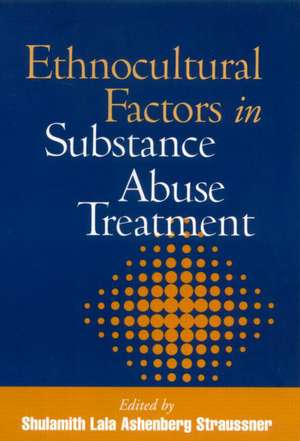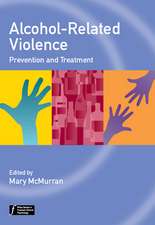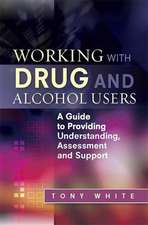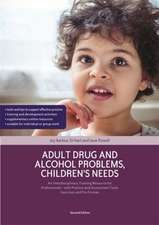Ethnocultural Factors in Substance Abuse Treatment
Editat de Shulamith Lala Ashenberg Straussneren Limba Engleză Hardback – 3 mai 2001
This book presents a culturally informed framework for understanding and treating substance abuse problems. From expert contributors, chapters cover specific ethnocultural groups in the United States, including Americans of African, Native American, Latino, European, Middle Eastern, and Asian descent. Authors examine how ethnocultural factors may affect a person's attitudes toward alcohol and other drugs, patterns of substance use, reasons for seeking treatment, and responsiveness to various interventions. Themes addressed include the impact of migration and acculturation issues, spiritual values and traditions, family structures, gender roles, and experiences of prejudice and discrimination. Featuring a wealth of illustrative clinical material, the book makes concrete recommendations for more competent, effective assessment and intervention. It also guides clinicians toward greater awareness of the ways their own ethnocultural backgrounds may affect their interactions with clients.
| Toate formatele și edițiile | Preț | Express |
|---|---|---|
| Paperback (1) | 341.00 lei 6-8 săpt. | |
| Guilford Publications – 3 apr 2003 | 341.00 lei 6-8 săpt. | |
| Hardback (1) | 683.35 lei 6-8 săpt. | |
| Guilford Publications – 3 mai 2001 | 683.35 lei 6-8 săpt. |
Preț: 683.35 lei
Preț vechi: 719.31 lei
-5% Nou
Puncte Express: 1025
Preț estimativ în valută:
130.75€ • 137.25$ • 108.53£
130.75€ • 137.25$ • 108.53£
Carte tipărită la comandă
Livrare economică 10-24 aprilie
Preluare comenzi: 021 569.72.76
Specificații
ISBN-13: 9781572306301
ISBN-10: 1572306300
Pagini: 447
Ilustrații: black & white illustrations
Dimensiuni: 152 x 229 x 30 mm
Greutate: 0.83 kg
Ediția:New.
Editura: Guilford Publications
Colecția Guilford Press
ISBN-10: 1572306300
Pagini: 447
Ilustrații: black & white illustrations
Dimensiuni: 152 x 229 x 30 mm
Greutate: 0.83 kg
Ediția:New.
Editura: Guilford Publications
Colecția Guilford Press
Public țintă
Professional and Professional Practice & DevelopmentCuprins
I. Introduction
1. Ethnocultural Issues in Substance Abuse Treatment: An Overview, Shulamith Lala Ashenberg Straussner
II. Working with Clients of African Background
2. Substance Abuse in African American Communities, Ednita M. Wright
3. Substance Abuse Issues among English-Speaking Caribbean People of African Ancestry, Eda F. Harris-Hastick
III. Working with Clients of Native American and Latino Backgrounds
4. Native Americans and Substance Abuse, Hilary N. Weaver
5. Substance Abuse among Cuban Americans, Eugenio M. Rothe
6. Substance Abuse in the Mexican American Population, Louis R. Alvarez
7. Toward an Understanding of Puerto Rican Ethnicity and Substance Abuse, Catherine Medina
IV. Working with Clients of European Background
8. Substance Abuse among Americans of British Descent, Katherine Stuart van Wormer
9. Substance Abuse Treatment with Clients of French Background, Ann A. Abbott
10. The Irish and Substance Abuse, Philip O'Dwyer
11. Italian Culture and Its Impact on Addiction, Pia Marinangeli
12. Polish Identity and Substance Abuse, Jim Gilbert and Jan Langrod
13. Russian-Speaking Substance Abusers in Transition: New Country, Old Problems, Helen Kagan and Kathryn C. Shafer
V. Working with Clients of Middle Eastern Background
14. Substance Use among Arabs and Arab Americans, Nuha Abudabbeh and Andrew Hamid
15. Jewish Substance Abusers: Existing but Invisible, Shulamith Lala Ashenberg Straussner
VI. Working with Clients of Asian Background
16. Substance Abuse Treatment Issues with Cambodian Americans, Mary Ann Bromley and Chhem Sip
17. Ethnocultural Background and Substance Abuse Treatment of Chinese Americans, Ting-Fun May Lai
18. Ethnocultural Background and Substance Abuse Treatment of Asian Indian Americans, Daya Singh Sandhu and Ruby Malik
19. Substance Abuse Interventions for Japanese and Japanese American Clients, Jun Matsuyoshi
20. Substance Abuse among Korean Americans: A Sociocultural Perspective and Framework for Intervention, Young Hee Kwon-Ahn
1. Ethnocultural Issues in Substance Abuse Treatment: An Overview, Shulamith Lala Ashenberg Straussner
II. Working with Clients of African Background
2. Substance Abuse in African American Communities, Ednita M. Wright
3. Substance Abuse Issues among English-Speaking Caribbean People of African Ancestry, Eda F. Harris-Hastick
III. Working with Clients of Native American and Latino Backgrounds
4. Native Americans and Substance Abuse, Hilary N. Weaver
5. Substance Abuse among Cuban Americans, Eugenio M. Rothe
6. Substance Abuse in the Mexican American Population, Louis R. Alvarez
7. Toward an Understanding of Puerto Rican Ethnicity and Substance Abuse, Catherine Medina
IV. Working with Clients of European Background
8. Substance Abuse among Americans of British Descent, Katherine Stuart van Wormer
9. Substance Abuse Treatment with Clients of French Background, Ann A. Abbott
10. The Irish and Substance Abuse, Philip O'Dwyer
11. Italian Culture and Its Impact on Addiction, Pia Marinangeli
12. Polish Identity and Substance Abuse, Jim Gilbert and Jan Langrod
13. Russian-Speaking Substance Abusers in Transition: New Country, Old Problems, Helen Kagan and Kathryn C. Shafer
V. Working with Clients of Middle Eastern Background
14. Substance Use among Arabs and Arab Americans, Nuha Abudabbeh and Andrew Hamid
15. Jewish Substance Abusers: Existing but Invisible, Shulamith Lala Ashenberg Straussner
VI. Working with Clients of Asian Background
16. Substance Abuse Treatment Issues with Cambodian Americans, Mary Ann Bromley and Chhem Sip
17. Ethnocultural Background and Substance Abuse Treatment of Chinese Americans, Ting-Fun May Lai
18. Ethnocultural Background and Substance Abuse Treatment of Asian Indian Americans, Daya Singh Sandhu and Ruby Malik
19. Substance Abuse Interventions for Japanese and Japanese American Clients, Jun Matsuyoshi
20. Substance Abuse among Korean Americans: A Sociocultural Perspective and Framework for Intervention, Young Hee Kwon-Ahn
Notă biografică
Shulamith Lala Ashenberg Straussner, DSW, LCSW,is Professor at the Shirley M. Ehrenkranz School of Social Work at New York University, where she is also Director of the Post-Master's Program in the Treatment of Alcohol- and Drug-Abusing Clients. She was a Fulbright Senior Scholar to Israel in 2003; Distinguished Visiting Professor at Ben-Gurion University of the Negev in Beer-Sheva, Israel, in January 2002; and Visiting Professor at the Omsk State Pedagogical University in Siberia, Russia, in the spring of 2000. Dr. Straussner has authored and edited numerous publications dealing with substance abuse and is the founding editor of the new Journal of Social Work Practice in the Addictions. She has served on the National Center on Substance Abuse Treatment panel on workforce issues and is a founding board member of the New York State Institute for Professional Development in Addictions. She serves as a consultant to various hospitals, agencies, and other organizations in New York and lectures on a variety of topics throughout the United States and abroad. She also has a private therapeutic and supervisory practice in New York City.
Recenzii
This is a superb, comprehensive primer for all clinicians. In uniformly thorough and clear chapters, the editor and contributing authors teach the reader how to think about the theoretical and practical significance of context and the multiple factors of race, ethnicity, and culture--always present and always wielding a critical influence. Reading this text is like learning a new language whose ideas and vocabulary open a wide new territory. In a world where diversity is normal, the concepts of cultural identity and ethnocultural conflict are key. This volume provides a map of cultural sensitivity that adds a vital, expanding dimension to traditional ways of thinking about addiction. It should be a basic text and clinical resource for years to come.--Stephanie Brown, PhD, Director, The Addictions Institute
This volume lays out the critical clinical issues involved in culturally competent practice. The authors provide a rich context for understanding current substance abuse patterns in an impressive range of ethnic groups--more than I have ever seen discussed under one cover. The information presented is well researched and referenced, and the authors do a nice job of avoiding rigidity in their recommendations. Several chapters address such groups within the culture as women, adolescents, and refugees, who have unique needs and for whom the clinician may need to vary his or her approach. The case examples give depth to the discussion and illustrate important intervention techniques. Social work students at all levels will find this text helpful. --Maryann Amodeo, MSW, PhD, Director, Alcohol and Drug Institute for Policy, Training and Research, and Associate Professor, Boston University School of Social Work
-This volume lays out the critical clinical issues involved in culturally competent practice. The authors provide a rich context for understanding current substance abuse patterns in an impressive range of ethnic groups--more than I have ever seen discussed under one cover. The information presented is well researched and referenced, and the authors do a nice job of avoiding rigidity in their recommendations. Several chapters address such groups within the culture as women, adolescents, and refugees, who have unique needs and for whom the clinician may need to vary his or her approach. The case examples give depth to the discussion and illustrate important intervention techniques. Social work students at all levels will find this text helpful. --Maryann Amodeo, MSW, PhD, Director, Alcohol and Drug Institute for Policy, Training and Research, and Associate Professor, Boston University School of Social Work
An extraordinarily sensitive work on substance abuse treatment, offering clinically illustrated, expert discussion of addictive behavior and treatment within 19 distinct ethnocultural groups.
--Choice, 12/15/2002Descriere
This book presents a culturally informed framework for understanding and treating substance abuse problems. From expert contributors, chapters cover specific ethnocultural groups in the United States, including Americans of African, Native American, Latino, European, Middle Eastern, and Asian descent. Authors examine how ethnocultural factors may affect a person's attitudes toward alcohol and other drugs, patterns of substance use, reasons for seeking treatment, and responsiveness to various interventions. Themes addressed include the impact of migration and acculturation issues, spiritual values and traditions, family structures, gender roles, and experiences of prejudice and discrimination. Featuring a wealth of illustrative clinical material, the book makes concrete recommendations for more competent, effective assessment and intervention. It also guides clinicians toward greater awareness of the ways their own ethnocultural backgrounds may affect their interactions with clients.














